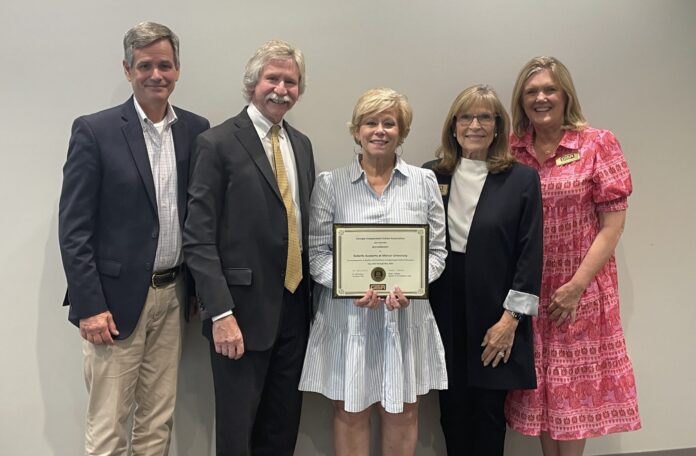
Macon — The Roberts Academy at Mercer University in Macon – a transitional elementary school for students with dyslexia – has been awarded full accreditation from the Georgia Independent School Association (GISA).
The accreditation reflects the Academy’s adherence to GISA’s rigorous standards, encompassing effective leadership, mission-driven policies and a robust educational environment.

“Achieving GISA accreditation is a testament to the hard work and dedication of the Academy’s faculty, staff and community and reaffirms its commitment to providing a safe, inclusive and academically rigorous environment for all students,” said Dr. Thomas Koballa, dean of Mercer’s Tift College of Education.
“We are absolutely thrilled to announce Roberts Academy’s recent GISA accreditation,” said Joy Wood, the Academy’s head of school. “This prestigious recognition not only affirms our commitment to excellence, but also significantly enhances our ability to support students with dyslexia. With this accreditation, we are better equipped to provide tailored educational strategies and a nurturing environment, ensuring every student can thrive and reach their full potential. This milestone brings us one step closer to fulfilling our mission of empowering students with dyslexia to achieve academic success and become confident, lifelong learners.”
Founded in 1986, GISA is a non-profit organization representing more than 170 independent
K-12 schools across the state. GISA’s mission is to promote excellence and collaboration among Georgia’s independent schools by supporting professional growth, advocacy, and interscholastic activities.
“From the state-of-the-art facilities, designed especially for its students, to the highly-qualified faculty trained extensively in the tenets of Orton-Gillingham, to the head of school who is widely known throughout the state for her experience and expertise in the study of dyslexia, the school is poised for great success,” said GISA President Jeff Jackson. “As a parent noted, Roberts Academy at Mercer University provides a ‘win-win’ opportunity for all involved – a place where self-advocacy, independent learning strategies and encouragement of each other foster a community centered on growth and respect.”
Member schools are dedicated to fostering the physical, intellectual, social and moral development of all students.
“Roberts Academy at Mercer University, the dream of the Roberts Family, is an extraordinary venture, providing a much-needed service to the families of Middle Georgia where successful and appropriate learning opportunities for neurodivergent learners are rare,” said GISA’s Director of Accreditation Paula Gillispie. “With the vision of the Roberts family and the combined dedication and passion of the head of school of Roberts Academy and the dean of Mercer’s Tift College of Education, the dream of such a school now exists.”
Roberts Academy will kick off its inaugural academic year on Aug. 14.
“We can’t wait to welcome our students to the Academy later this summer,” Wood said. “Our faculty and staff look forward to watching our students grow and thrive at Roberts.”
About Roberts Academy at Mercer University
The Roberts Academy at Mercer University is the only transitional elementary school of its kind in Georgia outside of Metro Atlanta. The mission of the Academy is to prepare students with dyslexia to achieve academic success through dynamic educational programs. The Academy teaches a comprehensive curriculum designed for grades 2 through 5 using the Orton-Gillingham approach, a specialized learning method clinically proven to help students with dyslexia. Students attend the Academy until they have mastered the skills to accommodate their learning differences and are prepared to succeed in a traditional school setting.








